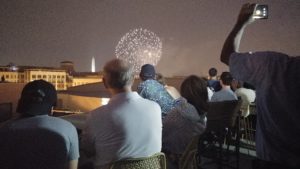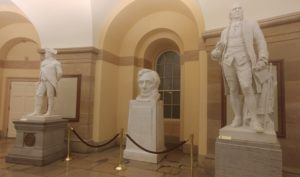By Kali Woods
A sense of patriotism ravaged the capital, as strangers from different places gathered together to revel in the anniversary of our  country. American flags blew gracefully in the breeze as innocent children ran carelessly through the grass with their sparklers; barbecue grills kindled with the pungent aroma of charcoal smoke; couples kissed passionately under the fizzling of the bright fireworks as if it were midnight on New Year’s Day; their smiles illuminated the night sky.
country. American flags blew gracefully in the breeze as innocent children ran carelessly through the grass with their sparklers; barbecue grills kindled with the pungent aroma of charcoal smoke; couples kissed passionately under the fizzling of the bright fireworks as if it were midnight on New Year’s Day; their smiles illuminated the night sky.
I wanted to be as joyous as them. I wanted to celebrate. I wanted to feel that same sense of pride, but my heart was conflicted.
When I look at the White House, I’m immediately enticed by its beauty. It stands unwavering in the midst of the hustle and bustle of the city, serving as the symbol for American prosperity. Everytime I see it, all of the giddy anecdotes I’ve heard in my history classes over the years instantly come to mind: a rotund William Howard Taft stuck in his presidential bathtub; a
cute, little John F. Kennedy Jr. hiding under the resolute desk; a smiling Bill Clinton playing with his dog, Buddy, on the White House lawn. I wish it could all be so sweet and simple, but as a Black woman in America, my conscience forces me to look past the picture perfect facade that our history books have painted over the years.

Thomas Jefferson’s words replay over and over again in my mind: “We hold these truths to be self-evident, that all men are created equal; that they are endowed by their Creator with certain unalienable rights….” Every year we celebrate the power held in these words, boasting about how much more morally sound America was in comparison to other countries back then, but where were the rights of my people? As I meditate on these words, I think of the many women who looked just like me, who were raped by the same Founding Fathers that pushed for the ideals of a just society. I think of the very White House that we admire so much that was constructed by hundreds of slaves laboring tirelessly under the watch of their relentless overseers, only to be denied entry for centuries into the very house which they had built. Where was that “liberty and justice for all” that we recited every morning in school? How had I celebrated the founding of my country for so long, knowing it was built off of the backs of my own ancestors?
I instantly felt disgusted in this holiday and myself, as I had found conviction in my own intersectionality. I was battling between my desire to be one with my fellow Americans and willfully acknowledging the struggles of my shortchanged ancestors. My mind wanted to explode.
I racked my brain trying to find a way to balance the two conflicting parts of me, and after digging deeper, I realized that the two sides had more in common than I originally thought. Jefferson’s same words, reiterated by Dr. King nearly two centuries later, allowed me to see that our country’s history is not perfect, but that we are a work in progress. America’s founding principles of equality, democracy, liberty and justice, although oftentimes found to be hypocritical, are the same coveted values that have inspired and still do inspire my people to push through their tribulations. I’m proud to be Black. And I’m proud to be an American, not because of my country’s foundations, but because of the steps we’re now taking to achieve the goals we should have from the beginning.
